This is the second article in a three-part series about Americans' perceptions of China and U.S.-China relations.
WASHINGTON, D.C. -- Many Americans say the U.S. and China should cooperate more on economic and energy issues; however they are divided on whether China's growing economy is a good thing or a bad thing for the U.S., according to a Gallup-China Daily USA study conducted in November and December 2011. U.S. opinion leaders are more likely than the American public to think China's burgeoning economy is good for the U.S., at 61% and 45%, respectively.
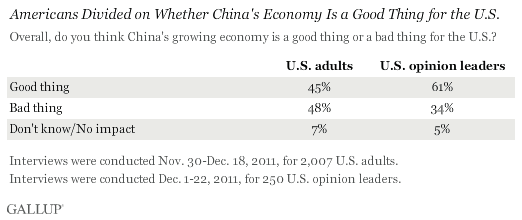
Americans, Opinion Leaders Uncertain About the Benefit of Chinese Investment
Americans and opinion leaders are uncertain about the impact of Chinese investment on the U.S. job market. Nearly one in four U.S. adults (23%) and 30% of opinion leaders agree with the statement that Chinese investment in the U.S. brings growth and jobs. About one-third of both groups disagree.
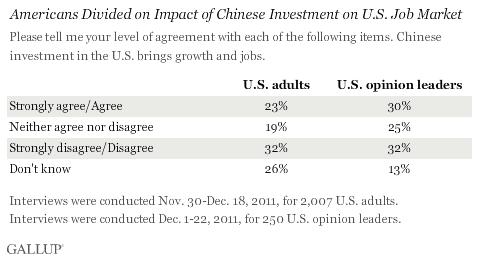
Chinese investment in American businesses topped $5 billion in 2010 and recent indications from China's commerce minister, Chen Deming, indicated the number would be much higher if the U.S. would allow it. Minister Chen also strongly encouraged the United States to ease restrictions on sending exports to China in order to address the $200 million trade imbalance in favor of China. The U.S. has expressed concern about a number of trade and economic issues, including intellectual property rights and market access restrictions that have, thus far, led to more limited trade between the two countries.
Two-thirds of U.S. adults say the trade imbalance between the U.S. and China is a major barrier to strong relations between the two countries, according to the Gallup-China Daily USA study. Opinion leaders are even more likely, at 78%, to hold this view. Roughly one-fifth of each group perceives the trade imbalance as a minor barrier.
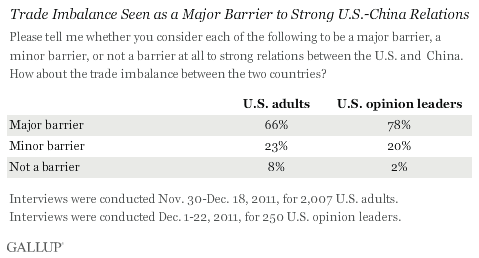
Americans Are Lukewarm on the Quality of Chinese Goods
U.S. opinion leaders are more likely than the American public to hold positive views about the quality of goods made in China. About half of opinion leaders rate the quality of Chinese goods as either "good" (41%) or "very good" (12%) and just under half say they are either "only fair" (41%) or "poor" (11%). Views of the American public are somewhat more negative with four in 10 expressing positive views and 58% expressing negative views about the quality of goods made in China.
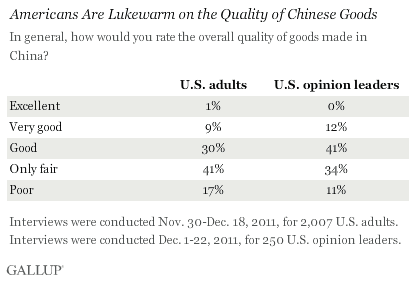
China's currency policy has provoked quite a bit of criticism for its perceived negative impact on the global economy. About four in 10 Americans (42%) and 48% of U.S. opinion leaders agree that China's currency is a major contributing factor to the U.S. economic situation. Far fewer in either group disagree -- 17% of U.S. adults and 24% of opinion leaders. The rest, totaling 41% of Americans and 28% of opinion leaders are neutral or say they "don't know" what kind of effect China's currency has on the U.S. economy.
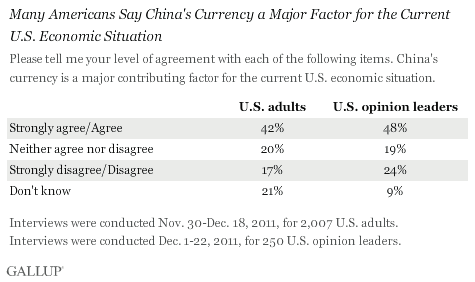
Implications
China and the U.S. are major trade partners and represent the two largest national economies in the world. While the American public and U.S. opinion leaders want more cooperation between the two countries on economic and energy issues, they have different views about the effect of a strong Chinese economy on the U.S. The majority of opinion leaders, compared with less than half of U.S. adults, believe China's growing economy is beneficial to the U.S. Opinion leaders are also more likely than U.S. adults to agree that Chinese investment in the U.S. contributes to U.S. job growth, although the majority of both groups are skeptical on this measure. China's leadership has indicated a desire to invest more in American business, while also encouraging the U.S. to export more freely to China. The already substantive trade partnership between these two countries is likely to swell significantly if U.S. policymakers move in this direction; however resolution is needed on a number of key trade issues before this would happen.
Survey Methods
In the first wave of a new research partnership between China Daily USA and Gallup, 2,007 Americans were interviewed in English only from Nov. 30-Dec. 18, 2011.Gallup surveyed a random sample of adults, aged 18 and older, residing in landline-telephone households, cell phone-only households, and cell phone-user households. The data set was statistically adjusted (weighted) using the following variables: race/ethnicity, gender, education, and age as defined by the most recent data from the Current Population Survey, conducted by the U.S. Census Bureau. The final overall results are representative of the U.S. adult population. For results based on the total sample size of 2,007 adults, one can say with 95% confidence that the margin of error attributable to sampling and other random effects is ±2.68 percentage points.
The opinion leader survey included a non-probability sample 250 opinion leaders, drawn from the ranks of business executives (n=50), government officials (n=50), think tank leaders (n=50), university faculty (n=50), and the media (n=50). The opinion leaders sample was collected from Dec. 1-22, 2011.
In addition to sampling error, question wording and practical difficulties in conducting surveys can introduce error or bias into the findings of public opinion polls. Click here to learn more about China Daily USA.
